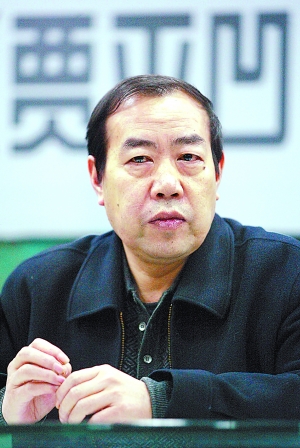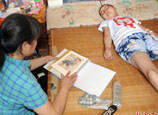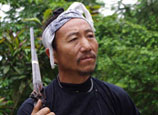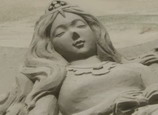
 |
| Jia Pingwa (Xinhua) |
By selling nearly 1 million hard copies and 500,000 ebooks of his latest novel in just five months, Jia Pingwa reasserted his status in the top echelons of Chinese contemporary authors.
"Dai Deng" is the story of how a female university graduate became a local official in a northwest China town. There, the graduate names herself Dai Deng, which means "carrying a lamp," and works hard to settle disputes between local residents, though mostly in vain.
As he has done for more than 30 years, Jia, 61, set his novel in the countryside of Shaanxi Province, where he grew up in a peasant family.
"I will devote the rest of my life to presenting the living conditions and psyches of rural residents," Jia said in an exclusive hour-long interview with Xinhua on Friday.
He knows that many critics and readers are skeptical about the importance of examining China's rural culture, which the country's rapid urban development is leaving in a precarious state. But Jia maintained that rural residents still account for half of China's 1.3 billion population and they deserve attention and respect from both authors and readers.
"Mega-cities like Beijing and Shanghai and numerous poor counties together form the reality of China. They are like two sides of a coin, and I choose to address the dark side," he said.
He also has another, more personal reason for using literature to explore and expose the countryside.
"I always heard a voice saying, 'The vast land is overgrown with wild grass, let the son of Jia's family plow it.'"
Jia said that because he grew up in the countryside, he feels at ease collecting inspiration for his novels in rural areas. Despite the book signings he must attend and lectures he has to give, Jia stays in villages for most of the year.
Some critics say his new novel is too pessimistic, because after failing to realize her ideals in the fact of a harsh reality, the protagonist Dai Deng lives like a ghost by the end of the book.
But Jia disagrees, saying the very fact that the protagonist is "self-luminous" because she carries a lamp with her shows that there is some light in the dark and repressed grassroots communities.
"This era is rough and stiff and lacks faith. I will write epics for common people so my readers' dreams can grow wings after reading my novels, even when they are in utter misery," said Jia.
That may be one of the reasons Jia's loyal readership features people from all walks of life.
According to Jia, the task for contemporary Chinese authors is recording the era with their pens. Alongside nonfiction, news reports, film, theater and other art forms, literature can offer rich material for later generations studying today's society.
During the interview, Jia also went into great detail about his ideal masterpiece.
In his opinion, a great novel should combine intriguing structure with effortless prose and delicious details.
















 Controversial audition for 'rich blind date' -- being pretty is just not enough
Controversial audition for 'rich blind date' -- being pretty is just not enough


![]()
